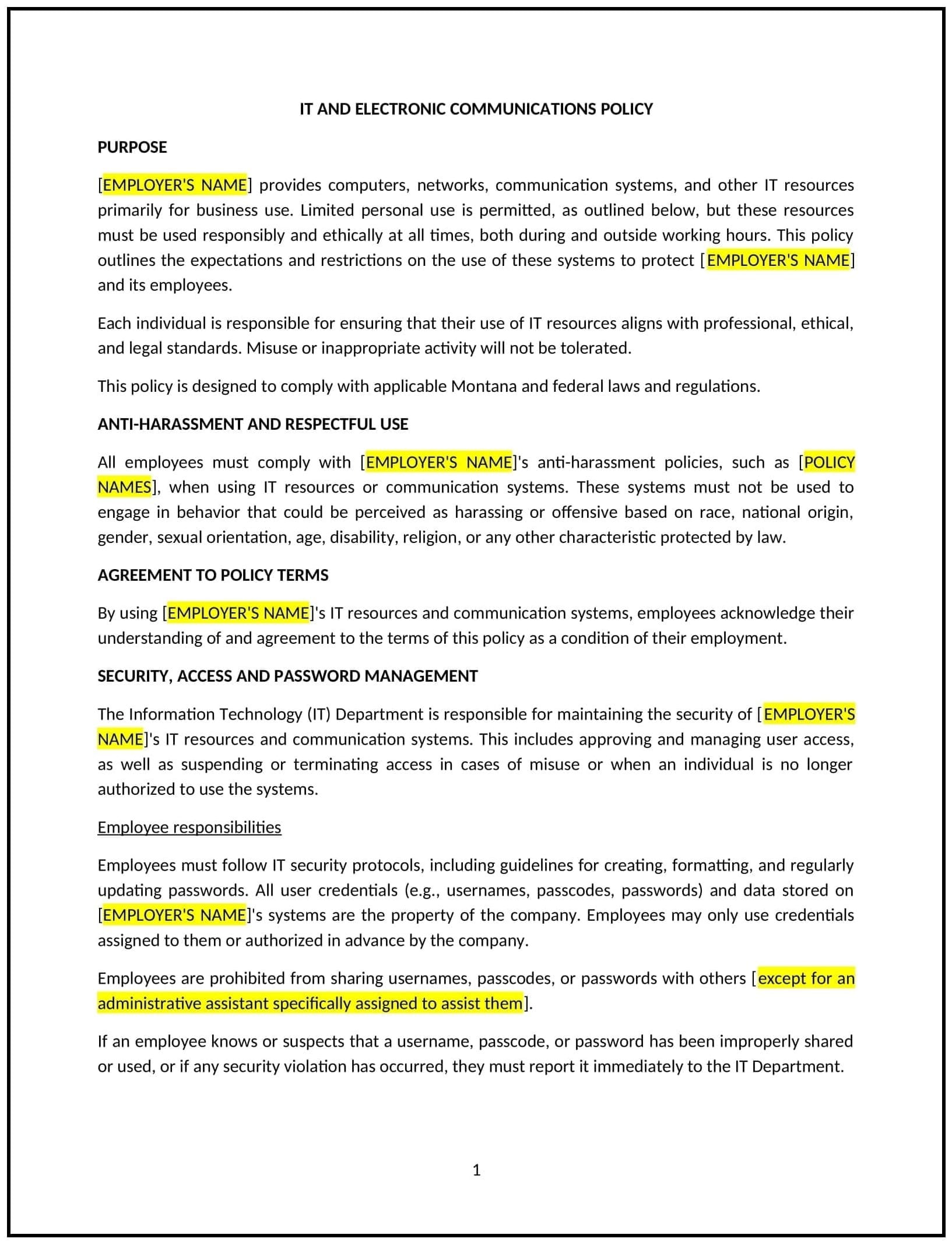IT and electronics communications policy (Montana): Free template
Got contracts to review? While you're here for policies, let Cobrief make contract review effortless—start your free review now.

Customize this template for free
IT and electronics communications policy (Montana)
An IT and electronics communications policy helps Montana businesses manage the use of company-provided electronic devices, software, and communication platforms. This policy outlines guidelines for appropriate use, data security, and compliance with legal requirements when employees use computers, phones, and other electronic devices for business purposes.
By implementing this policy, businesses can protect their data, maintain productivity, and ensure responsible use of technology, reducing the risk of security breaches and misuse of company resources.
How to use this IT and electronics communications policy (Montana)
- Define acceptable use: The policy should specify what constitutes acceptable use of company-owned IT resources, including computers, mobile devices, software, and communication tools, such as email and instant messaging platforms.
- Establish guidelines for personal use: The policy should outline whether employees are allowed to use company devices for personal purposes and any limitations on personal use, ensuring that personal activity does not interfere with work responsibilities.
- Address data security and privacy: The policy should include provisions for safeguarding company data, including how to handle confidential or sensitive information, use of encryption, and secure communication methods. Employees should be instructed to report any security breaches or suspicious activity.
- Set expectations for communication: The policy should define the expectations for professional conduct in electronic communications, including email etiquette, acceptable language, and the proper use of communication platforms.
- Specify monitoring and auditing: The policy should clarify whether the business monitors the use of electronic communications and IT resources, including email and internet usage, to ensure compliance with company guidelines and to protect against misuse.
- Outline consequences for misuse: The policy should detail the consequences for violating the policy, such as disciplinary actions, loss of access to company resources, or termination of employment, depending on the severity of the violation.
- Review and update regularly: The policy should be reviewed periodically to ensure it remains aligned with technological advancements, company needs, and evolving legal or security requirements.
Benefits of using this IT and electronics communications policy (Montana)
This policy provides several key benefits for Montana businesses:
- Protects company data: A clear policy helps safeguard sensitive business data by setting standards for data security and privacy, reducing the risk of data breaches, cyberattacks, or unauthorized access.
- Increases productivity: By setting clear expectations for appropriate use of IT resources, businesses can prevent misuse of technology and ensure that employees remain focused on their work tasks.
- Reduces legal and regulatory risks: A well-defined policy helps businesses comply with industry regulations and legal requirements, such as data protection laws and intellectual property rights, reducing the risk of legal issues or fines.
- Enhances professional communication: Setting guidelines for electronic communications ensures that employees use professional language, behave respectfully, and maintain clear communication standards across the organization.
- Improves device management: A comprehensive policy helps businesses manage the use of company devices, software, and communication platforms, ensuring they are used responsibly and are regularly maintained and updated.
- Strengthens business reputation: A company that prioritizes security, professionalism, and proper use of technology demonstrates a commitment to responsibility, which can enhance its reputation with clients, customers, and partners.
Tips for using this IT and electronics communications policy (Montana)
- Communicate the policy clearly: Ensure all employees are aware of the IT and electronics communications policy, including the guidelines for acceptable use, data security, and the consequences for violating the policy.
- Offer employee training: Provide regular training on the proper use of company IT resources, focusing on data security best practices, appropriate communication methods, and how to report any potential security threats.
- Monitor usage responsibly: While the policy may allow for monitoring, businesses should ensure that monitoring is done in a manner that respects employee privacy and aligns with legal standards.
- Review and update the policy regularly: The policy should be reviewed and updated as needed, especially as new technology, software, or communication tools are introduced, or as security risks evolve.
- Promote a culture of responsibility: Encourage employees to be mindful of the impact of their use of company devices and communication tools, emphasizing the importance of maintaining professional and secure communication at all times.
- Set clear reporting procedures: Provide employees with clear instructions on how to report any security incidents, breaches, or misuse of company IT resources, ensuring a timely and effective response to any issues that arise.